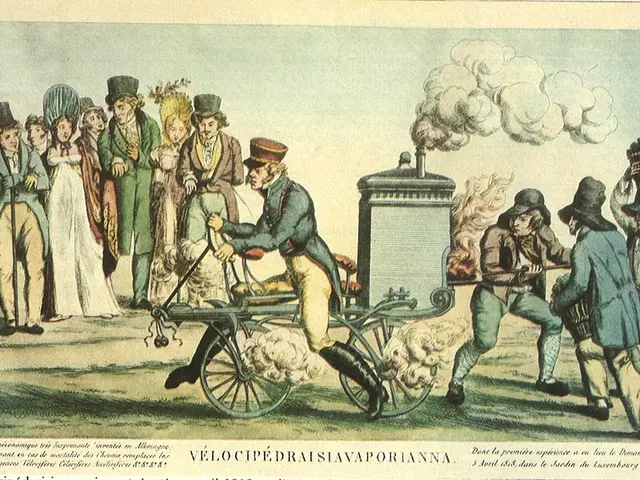Stirring Worry in the Present: Mounting War Woes in Modern Germany
Growing anxiety over war is being felt among Germans by their therapists - German Psychologist Expresses Apprehension over War Anxiety in Germany
Eight decades since the conclusion of World War II, war-related apprehension continues to loom large in Germany, with the simmering crises in Ukraine and the Middle East serving as constant reminders. Mathias Heinicke, psychotherapist and chair of the Association of Contract Psychotherapists, discerns a growing unease among the populace.
Heinicke shared his observations with the German Press Agency, stating that as global conflicts edge closer, so too does the level of worry in the population. In his practice, he witnesses an uptick in worries and future concerns among patients due to the growing unrest, with the European presence of Ukraine as a significant factor.
Beyond geography, news, visuals, and social media play a major role in escalating war worries. "The gruesome images we encounter - lifeless bodies, razed buildings, children's hospitals under attack - unsettle us profoundly," Heinicke observed.
War worries manifest themselves differently
Gone are the days when one could easily switch off the radio or television. In today's digital age, we are inundated with new information, news, visuals, and videos anytime, anywhere, via our smartphones. Social media channels, which offer an unfiltered and unrefined feed, can significantly sharpen war worries, destruction, and future dread.
War worries is not a static medical term. Symptoms can vary widely: tension and jitters, compulsive thoughts and brooding, panic attacks, headaches, arrhythmias, or irritability.
Heinicke advises those who feel at risk of war worries to activelyfilter their channels. "I don't have to watch everything that theoretically could play out," he suggests, emphasizing the importance of setting personal boundaries or deliberately blocking distressing content.
War worries
Ukraine
Navigating the Past and the Present
War's end
Germany
World War II
Conflict
News
Frankfurt am Main
German Press Agency
Communal Struggles
Future
Europe
Incorporating insights from socio-political, psychological, and economic perspectives, current factors contributing to war worries in Germany include:
Socio-Political Factors
- Gauging Tensions in Europe: The ongoing crisis in Ukraine has elevated tensions across Europe, tugging at the strings of military conflict concerns. Although specific data for Germany is sparse, the general European apprehension about military conflict may resonate among the German populace[1].
- Creeping Anxiety About War: The conflict in Ukraine has sparked an unprecedented rise in anxiety about military conflict across Europe. While Germany's statistics are not provided, the broader European fretfulness could color German perceptions[1].
- Eastern European Nervousness: Germany's geographical proximity to Eastern Europe and the continuous strife in Ukraine might amplify concerns about regional security and stability[4].
Psychological Factors
- Indirect Exposure to Turmoil: Although not directly implicated in the conflict, Germans may experience stress due to indirect exposure through media and global connections.
- Mental Health Support for Refugees: The surge of Ukrainian refugees and the psychological toll of addressing their needs could contribute to a feeling of shared anxiety and pressure within the German community[3].
- Cultural Sensitivity and Trauma Care: The need for culturally sensitive trauma care for refugees underscores the psychological impact of war on displaced populations, indirectly affecting the mental health of host communities[3].
Economic Factors
- Energy and Resource Insecurity: The strife in Ukraine has significant repercussions for energy security and resource availability in Europe, stirring economic apprehension and, by extension, war worries in Germany[4].
- Financial Instability: The economic fallout caused by the conflict and potential sanctions could exacerbate financial insecurities, further fueling overall anxiety levels[1].
Overall, these factors contribute to an escalated war worries sentiment in Germany, as the nation grapples with the broader ramifications of the Ukraine conflict on European security and stability.
- Mathias Heinicke, a psychotherapist in Germany, has observed an uptick in anxiety among his patients about global conflicts, with the geographical proximity and European presence of Ukraine being significant factors.
- Beyond geography, news, visuals, and social media contribute to the escalation of war worries, as the constant barrage of gruesome images and reports from conflict zones unsettle people profoundly.
- Conflict zones can have a psychological impact not just on the populous in the conflict zone, but also on those who are indirectly exposed through media and global connections, such as the German community.
- Mental health support for refugees fleeing these conflicts, as well as the need for culturally sensitive trauma care, underscores the psychological impact of war on displaced populations and host communities.
- The strife in Ukraine also has significant repercussions for energy security and resource availability in Europe, and the potential economic fallout could exacerbate financial insecurities and further fuel overall anxiety levels in Germany.
- Mathias Heinicke advises those who feel at risk of war worries to actively filter their channels, setting personal boundaries and blocking distressing content to help mitigate the anxiety caused by constant exposure to the turmoil of war.








